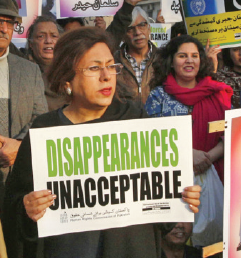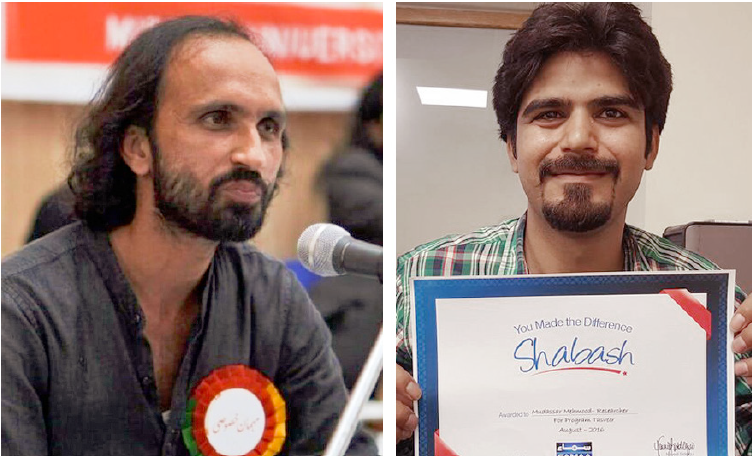Pakistan has become a hopeless soil for those, who suffer enforced disappearances as some of them return home. At the same time, most spend years in disappearance, and some unfortunate ones remain missing till their families stop hoping for their return with confusion about them being dead or alive. The governments, courts and rights groups seem helpless in such cases as their efforts to recover the enforced disappeared persons go down the drain.
According to the Human Rights Commission of Pakistan’s statistics, the commission received 10,238 cases of enforced disappearance from 2011 till end-May 2025 of which 2,251 cases of enforced disappearance were unresolved by the Commission of Inquiry on Enforced Disappearances. In 2023, 885 cases were received; in the first five months of 2024, 150 cases of enforced disappearance were reported.
In recent years, two cases got immense attention; the mysterious disappearance of journalist, Mudassar Mahmood Naaru and the enforced disappearance of poet and activist Ahmad Farhad Shah. Farhad Shah is fortunate enough as he, at least, has been declared as an enforced disappeared person but the brother, the young kid and the widowed mother of Naaru, are still trying to find out if he is dead or alive.
Ahmad Farhad, who got popularity for his revolutionary poetry and humanitarian views in the wake of the crackdown against the PTI, was ‘abducted by unidentified men on May 14 from Islamabad. His wife, Urooj Zainab told media, ‘Farhad was returning home after a dinner late on May 14 night when four men grabbed him outside the gate of the house and dragged him into a car’.
She said that Farhad belongs to the Bagh district of Kashmir but the family settled in Islamabad. ‘He expressed his apprehensions several times about his arrest as he supports human rights and speaks against violations in the wake of May 9 incidents which is perceived as a support to the PTI.’ She said her husband was loyal to humanity, not any political party, as he always raised his voice against human rights violations regardless of affiliation.
She says, ‘In the past, Farhad spoke for PML-N when the PML-N leaders and supporters were under pressure by the powerful quarters.’
Before his disappearance, Farhad recorded vlogs on social media networks about protests in Kashmir. Some of his critics say that he misguided his viewers about the death toll in Azad Kashmir during the protests with incorrect facts.
However, Farhad’s poem ‘Mujhe Utha Lo’ (Take Me Away), which criticised enforced disappearances, gained instant popularity which is believed to be the real cause of his disappearance. The next morning of Farhad’s disappearance, his family filed a petition to the Islamabad High Court (IHC), alleging that he ‘disappeared’ from outside his home in Islamabad by Inter-Services Intelligence (ISI), for his criticism
JUNE 2024 of the powerful institutions and authorities.
The IHC in successive hearings tried its best to recover Farhad through repeated instructions to the government but failed. The state officials told the court that he was not in the ISI custody.
On May 29, the Attorney General of Pakistan apprised the court that Ahmad Farhad was a suspect in a case registered in the Bagh district and is currently under Azad Kashmir police custody.
Meanwhile, an Anti-Terrorism Court in Muzaffarabad rejected the bail plea of Farhad on June 4 and directed police for his medical checkup.
On June 10, An IHC Judge Mohsin Akhtar Kayani declared Ahmad Farhad, a missing person and termed his arrest illegal. He proposed formation of a larger bench for hearing cases of missing persons.Justice Kayani disposed of the petition seeking recovery of Farhad. He expressed strong doubts about Farhad’s arrest and production before the court in Azad Kashmir.
The IHC judgment said, ‘Syed Farhad Ali Shah is declared an enforced disappearance/missing person until he reaches his home safely.’
It further says, ‘When Mr Farhad reaches his home, the investigation officer of Islamabad’s Lohi Bher police station is bound to record his statement under Section 164 of the Code of Criminal Procedure (CrPC) before a judicial magistrate and proceed with the investigation as a result.’
The judgement said that the state machinery failed to recover Farhad and ‘his enforced disappearance started on May 15, 2024 from Police Station Lohi Bher and ridiculously legitimatised on May 29, 2024, the court, while examining all the facts and record, declares his arrest as illegal’.
The IHC, on the issue of combining all cases of enforced disappearance, pending before the IHC, ordered that the cases be presented before the IHC Chief Justice so he, using his administrative powers, may form a larger bench to deal such cases in a better way.
The judgment further said, ‘All such cases that pertain to national security affairs be fixed for in-camera hearing and if it is an important matter, then a larger bench may hear them after being briefed by heads of top investigative institutions. And directives shall be issued to not report such cases in media.’
Farhad’s case is not over yet. He has to reach home safely from Azad Kashmir. In Mudassar Naaru’s case, even the media has stopped highlighting it.
Naaru went missing while on vacation in Kaghan with his wife, Sadaf Chughtai, and then six-month-old son, Sachal in 2018. His family launched a campaign for his recovery but faced another tragedy in 2021 when Naaru’s wife died of a heart attack under mysterious circumstances at her residence.
His son Sachal is almost seven now. He is also a part of the efforts with his widow grandmother Rahat Mahmood and uncles for recovery of his father. Ms Mahmood says, ‘Sachal also prays that his ‘chotay abbu’ comes back home soon,’ as he believes that Naaru’s elder brother and his wife are his biological parents and not the ones that he has lost.

Rahat Mehmood has also approached the Islamabad High Court to seek recovery of his missing son along with family members of victims of enforced disappearance. She also met then prime minister Imran Khan on a court direction but was surprised when IK asked her about Naaru’s view.
There might be dozens of Farhad Shah and Mudassar Naaru in Pakistan. It is the state’s responsibility to locate them and bring them before the nation. If they have committed a crime, punish them according to the law of the land. If they are victims, release them.
Afterword: Ahmed Farhad has now been reunited with his family in Islamabad.
The writer is Executive Editor ‘News Lens Pakistan’ and fortnightly ‘Truth Tracker’.



